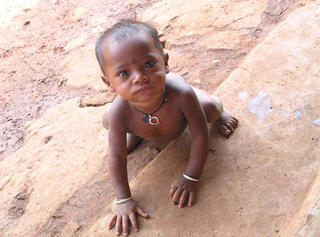Field trips are the reason for my being here.
…
I’ve realised that I’m much less intrusive with my picture taking these days. The people I meet aren’t comfortable with cameras (they haven’t been included in the obnoxious tribal tours that the Orissa Tourism Department organises). I’ve lost many photo ops this way, but as far as sensitivity goes, I think I’m doing well.
Apart from fieldwork, I visited a
haat- the weekly market in one of the districts I stayed in. It was so festive – with all the neighbouring villages marketing their surplus produce, coming from as far as 20 km away. It’s quite a party – desi alcohol made from ragi, fried food, vegetables and livestock for sale. I picked up the prettiest electric blue bangles there. The women laughed at the faces I made when they tried forcing impossibly small bangles past my reluctant fist, insisting that bangles are supposed to hurt. They also had plans of getting me drunk, but I maintained I was there for work.
Two of the cooks at one of our field centres invited me to watch their Magh festival, colloquially called ‘kukuda’ puja- kukuda meaning chicken. In honour of Magho devi, around 40 chickens were being sacrificed at dawn near the dam by the village. The puja was not on time and I woke up both Rammo and Bhaggo at five by calling for them outside their huts. When they did start the puja, there were no unnecessary rituals. The men picked up their kukudas, walked to the dam where altars made from leaves were set up the night before and arranged betel leaves on the ground. The chickens ate offerings from the ground and out came the
panniki (
boti in Bangla – a blade that curves upwards, at a right angle to the ground). Bhaggo, with extensive experience in our kitchen, did the honours. Off comes the head, blood was poured on the leaves in the altar and the decapitated body thrown aside where the children have gathered, laughing and flapping their arms around the headless chickens. Group photo. And vegetarian meals for the rest of my travels.
…
The set up in most of our field offices is that the office and spare room are at a distance from the kitchen and the staff residences. I make the walk up the path from the kitchen after dinner with a lantern, singing in my head (aloud just seems spooky in the dark). Dinner conversation inevitably veers to first hand supernatural encounters. Stories of ‘daainis’ (women who roam about naked, walking on their hands, feet in the air), possession by spirits and knocks on doors and windows in the middle of the night kept me up for a couple of nights. Then relief (and sheepishness) comes with daybreak.
Bathing is always a song and dance routine. This time around, there were no women to accompany me to nearby streams. The men would take over the well or hand pump while I dragged my bucket to my room. The first morning by the well was horrific. I filled my big aluminium bucket to the brim and began to haul it up the path, refusing any help that was offered- not wanting to seem like a spoilt city girl. There was a huge wet patch that I didn’t think much of and I began to take small steps across it. Turned out that the patch was moss with a sheet of water over it. Just as I thought I was getting the hang of things, my feet did a bad moonwalk and I landed squarely on my bottom. I was then required to learn the correct technique of drawing water from a well and sidestepping any suspicious puddles. I’ve come to think of it as my breaking-the-ice episode.
Food was fabulous, but the kitchens never are. Meals are in a mud hut divided into two parts- one for cooking and the other for eating. We sit on the floor with a sheet of tarpaulin over our heads to prevent mouse droppings from falling into our plates.
…
The Boudh Palace. Last stop. Last minute invitation from a member of the royal family. The royal family and palace are romantic only in name. The family is now dispersed, with no income from moneylending and the zamindari system like before. The palaces are mostly in ruins, with more than half the rooms rented out to forty odd families -- a new source of income from another type of landlordism. Descendants are seeking jobs in metros while the elders stay at home, keeping house. There was an entire family of tigers- stuffed and put on display in the living room. Four cubs.
The grandson told me he still goes for
shikaar but only manages to kill sambar. At that point, I wanted a rifle myself.
Any oohs and aahs I had for the palace soon disappeared and I began to look at things as they were – a dilapidated, badly maintained building with a family trying to cope with dwindling income. Or perhaps I’ve become prejudiced in my thinking. Spending four weeks with those who think nothing of sixteen-hour working days for minimum wage (or not even that much) will do that to a person’s point of view.




